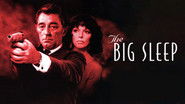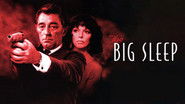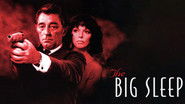Hellen
I like the storyline of this show,it attract me so much
Dotsthavesp
I wanted to but couldn't!
Spidersecu
Don't Believe the Hype
Megamind
To all those who have watched it: I hope you enjoyed it as much as I do.
robertguttman
"The Big Sleep", re-located from 1940s Los Angeles to 1970s Britain. An impeccable cast cannot overcome the fact that this is really a rather lackluster production. It is not that this is a bad film. It is simply that, despite the color cinematography, this version comes off as pale and bland in comparison with Howard Hawk's superb black-and-white 1946 version.
jaibo
This remake of the Raymond Chandler novel is an object lesson in bad film-making. It should have been a contender - Robert Mitchum had been ideally cast as Philip Marlowe in 1975's Farewell, My Lovely and he is surrounded here by some high calibre talent. But British director Michael Winner so messes up the script, the direction and the mis-en-scene that the film is the very definition of poor. At times it looks as though someone has conned a load of old actors into performing in their home movie shoot. Perhaps this film is a joke on the cast, many of whom were old enough to be heading for "the big sleep" themselves and so were the butt of Winner's sick joke.Mitchum walks through the film without shaming himself too much (although he shouldn't run or fight at this age); some of the other actors give the worst performances of their career: James Stewart is beyond self-parody as the dying General; Sarah Miles lolls her tongue whilst sporting an afro perm (!), Richard Boon grimaces and growls to entirely comic effect and Candy Clark does the kind of acting one expects to see in an early John Waters film - a kind of mickey-take of acting - which is funny when Waters' cast does it deliberately but embarrassing when Clark (a promising actress previously) does it for supposedly serious effect here. A couple of the English actors, such as Richard Todd and John Mills, acquit themselves with dignity, although Edward Fox is hilariously bad in his scenes, plummy accent chewing words to pulp. Any film where Joan Collins gives one of the most convincing performances has got to be going wrong somewhere...Winner's script is a dog's dinner. He sets up the expectation that he's going to follow the convention whereby we only see and find out what Marlowe sees and finds out (a staple of detective films) and then adds random cutaways to events which Marlowe was not present at - e.g. the car going into the Thames - as well as plonking a lot of mismanaged flashbacks into the action every time anyone begins to talk about what has happened in the backstory. As usual with Winner, the film is cut with the finnesse of a village butcher, and setting the grimy noir in the posher areas of London and the English countryside does nothing to conjure the seamy world of the book.All in all, a pretty dismal addition to the list of Chandler adaptations, but worth seeing for the unintentional laughs (there are plenty) and as a lesson in how not to make a film, or what parts not to choose when you're an ageing actor.
bootlebarth
Michael Winner, who claims as many of the credits (I use the word loosely) as he can for this celluloid abomination, is an intriguing phenomenon. He makes dreadful films, but presumably they earn enough at the box office to persuade yet another philistine, bean-counting producer to sign him up for another assault on sensitive eyes.As a sideline, the horrendously smug and obese Winner is a restaurant critic. Some of the less respectful publications in the UK hint that Winner is so loathed by chefs that every dish he is served contains a not so secret ingredient. How can I explain? The special stuff that is added in the kitchen to Winner's sauces and soups could otherwise have been deposited at the local branch of the Sperm Bank.Does Winner think he makes good films? How did he persuade Mitchum, Stewart, Reed et al to take part in this dire production? Do superannuated movie legends have no self-respect? Surely they don't need the money. Shame on them all for signing up with him.As a standalone film, this might earn 3 stars out of ten. As an unbelievably misconceived remake of a 1940s classic (despite all the loose ends of one of the most complicated and creakiest plots ever), I'm being too generous in awarding the IMDb minimum of one star.
The_Void
Most people would probably run a mile at the thought of Michael Winner getting his hands on the rights to film Raymond Chandler's masterpiece novel 'The Big Sleep'; but personally, I was rather excited at the prospect. Michael Winner may not be a great director; but his films generally turn out to be entertaining in spite of not being brilliant, and with a story as strong as this one; I felt confident that The Big Sleep would be a good film. However, as it turns out; this film is not as good as it could have been. The story focuses on private investigator Philip Marlowe. He is hired by an old man who goes by the name of General Sternwood to investigate a case of blackmail against one of his daughters. After meeting the daughters and some of the other main players involved, our hero soon comes to the conclusion that the blackmail doesn't really constitute a threat and becomes suspicious; leading to him thinking that everything seems to be more connected with the disappearance of the man's son in law, and decides to investigate that instead.For one reason or another, Michael Winner has decided to move things over to England; although the lead man remains American. This change in location has not really had an effect on the story; but it did leave Winner free to recruit an excellent roster of British stars. Among the names in the cast list are Oliver Reed, John Mills, Joan Collins, Richard Boone and Edward Fox. The film is lead by Robert Mitchum, who while not as great as Humphrey Bogart, still makes an excellent leading man and there's also enough room in the cast for an aging James Stewart. The film is a lot shorter than the earlier version of this story and Winner has really trimmed things down a lot, which means that the story is much more straight forward than it was in the 1946 film. This is not really a bad thing as it does mean that the film is easier to follow; although it also seems less expansive. The characters take something of a backseat too, with only the lead character getting any real development. Still, this is at least an entertaining thriller and I don't feel like I wasted my time watching it; although Howard Hawks' version is better.






